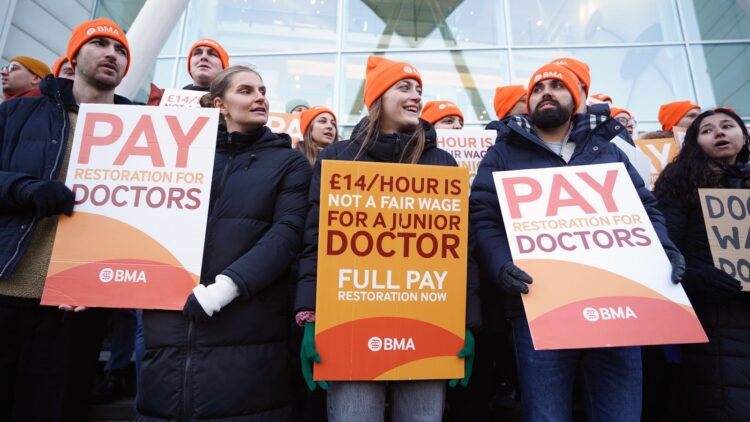By Charles Webster-
Junior doctors in England have embarked on a historic six-day strike, marking the longest industrial action in the history of the National Health Service (NHS).
Members of the British Medical Association (BMA) took to picket lines outside hospitals across the UK, including renowned medical institutions like St Thomas’ in London, Queen’s Medical Centre in Nottingham, and Royal Victoria Infirmary in Newcastle.
The strike, which began at 7 am on January 3 and is scheduled to last until 7 am on January 9, has prompted concerns from health service executives who fear it could result in one of the most challenging starts to the year the NHS has ever faced.
The BMA defended the strike, citing the failure of the government’s December pay offer to adequately address real-terms pay cuts dating back to 2008. Dr. Robert Laurenson, co-chair of the BMA’s junior doctors committee, emphasized that strike action was the only recourse to make the government pay attention to the significant workforce crisis faced by junior doctors.
“We need to recognize that we have a massive workforce crisis,” said Dr. Laurenson. He acknowledged that there is “no good time to strike” but stressed the urgent need to address the issues facing the healthcare workforce.
The strike, involving junior doctors in England with one to nine years of experience, comes after a series of negotiations with the government over pay increases.
The BMA rejected the government’s offer of a 3% pay rise, arguing that it does not adequately compensate for the 26.1% real-terms pay cut experienced by junior doctors between 2008 and 2022.
Healthcare professionals on the picket lines expressed concerns about the state of the NHS, with some junior doctors indicating that colleagues are leaving for countries like Australia due to more attractive employment packages.
Shivani Ganesh, a junior doctor outside St Thomas’ hospital, emphasized the importance of increasing pay to ensure a stable NHS workforce for future patients.
The strikes, which follow a three-day action in December, have garnered attention for their potential impact on patient care. Julian Hartley, chief executive of NHS Providers, expressed concern about managing patient safety and quality during this period. Urgent care will be prioritized, but routine appointments and operations are likely to be rescheduled.
The BMA’s demands include full pay restoration to reverse real-term cuts since 2008/9, a new pay mechanism to prevent future pay decreases against inflation and the cost of living, and a reformed Doctors’ and Dentists’ Review Body for independent and fair pay recommendations.
The government has expressed its willingness to return to negotiations if the strikes are called off. However, the ongoing industrial action adds to the challenges faced by the NHS, already dealing with seasonal pressures such as COVID, flu, and staff absences due to sickness.

AD: Heritage And Restaurant Lounge Bar
-
Share On
- Categories
- Date



